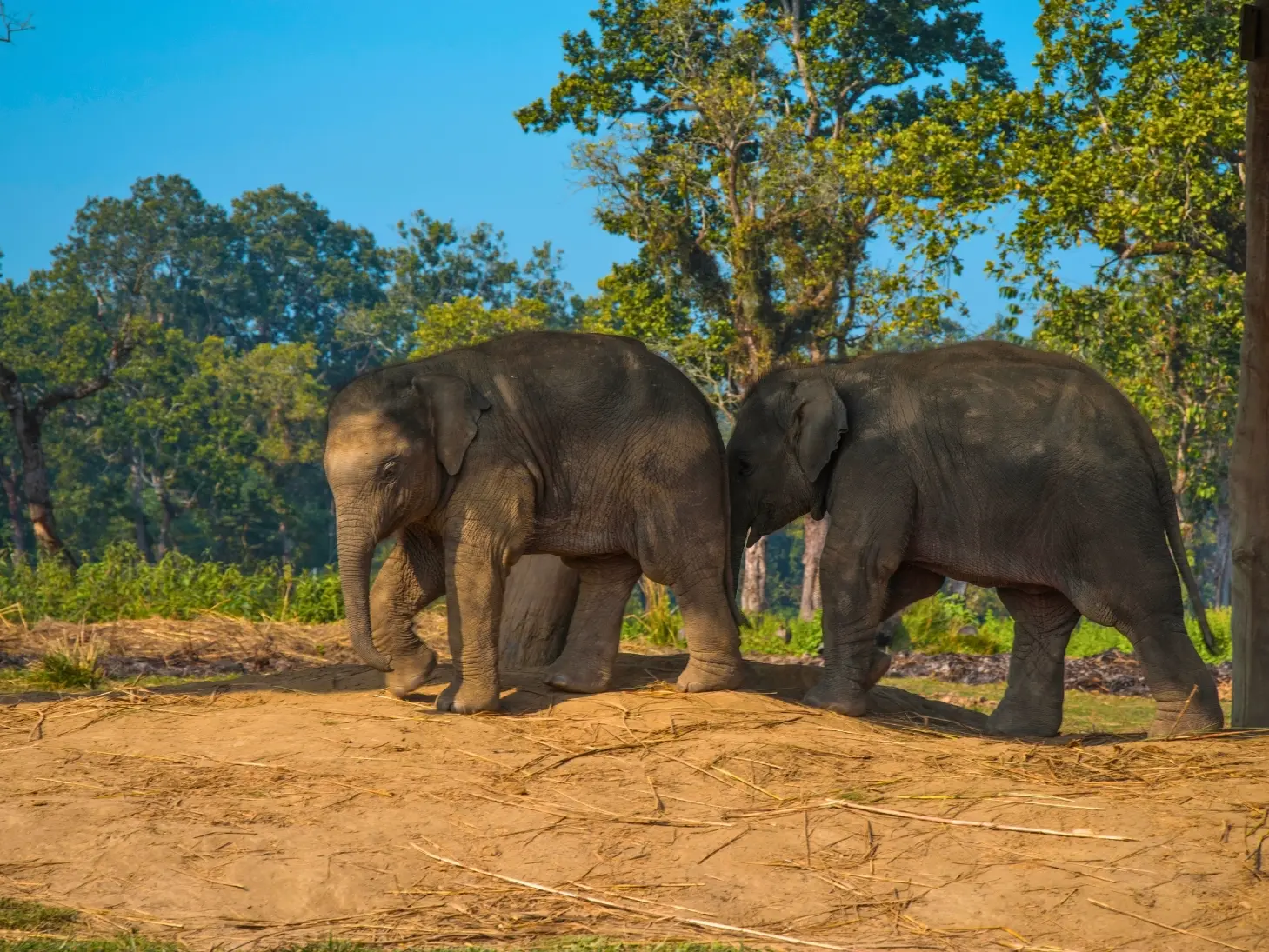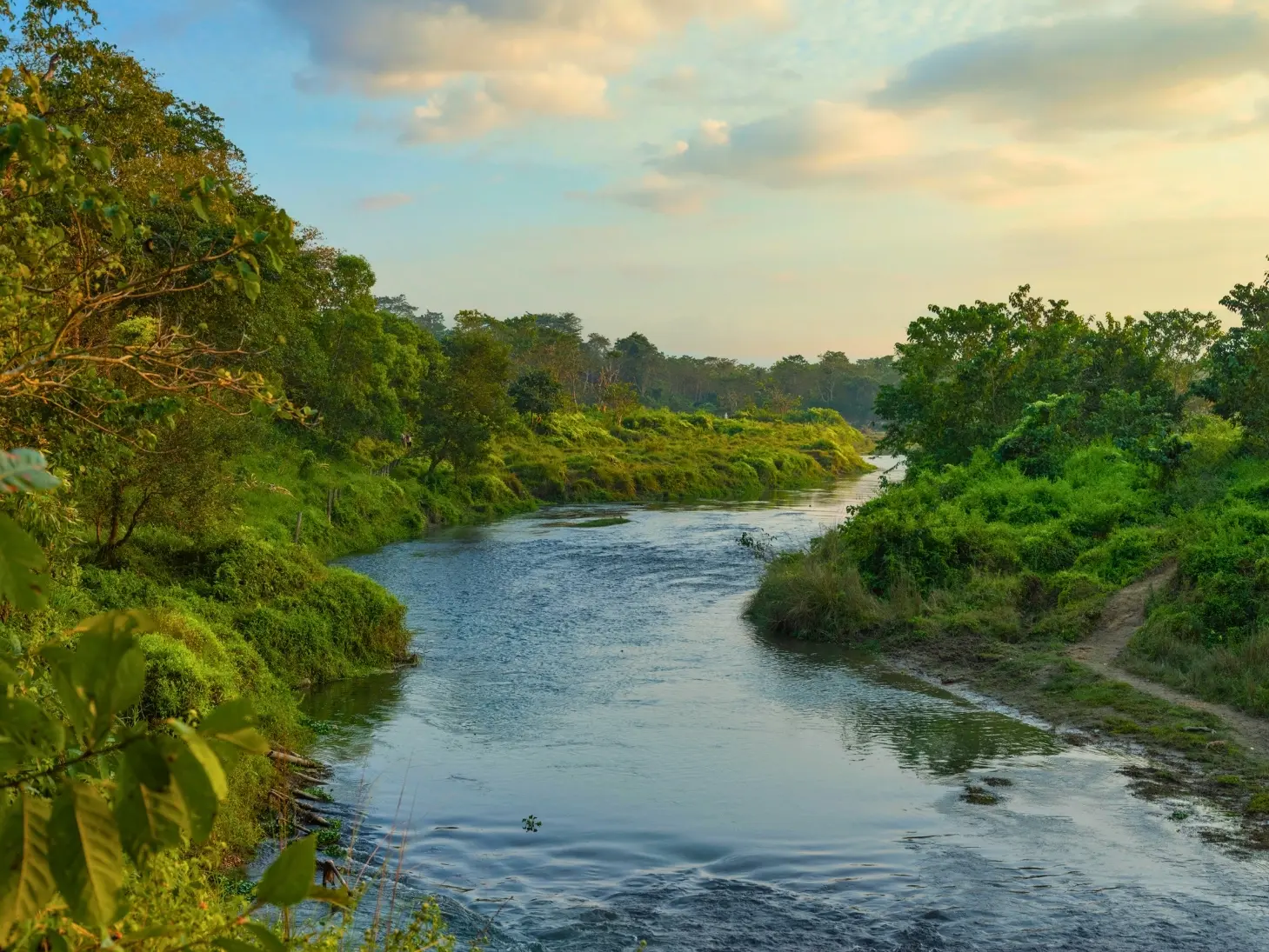Chitwan Jungle Safari is a peaceful trip into Nepal’s wild side. You can see animals like tigers and rhinos, enjoy quiet boat rides, and learn about the local Tharu culture. It’s a calm and natural place where the forest feels alive, and every moment brings you closer to nature’s heart.

Why Chitwan is Nepal’s Soul of the Wild?
Chitwan is called the soul of the wild in Nepal because it holds a deep connection with nature. This beautiful jungle is home to rare animals like tigers, rhinos, and elephants. It also has peaceful rivers and thick forests that feel untouched by time. The local Tharu people live in harmony with the land, adding to its charm. Visiting Chitwan is more than a safari—it’s a gentle reminder of how pure and powerful nature can be.
From Temples to Tigers—The Natural Shift of Nepal’s Journey
Nepal is famous for its temples and mountains, but people now also explore its rich jungles. Chitwan offers a peaceful escape into nature, where tigers and rhinos live freely. This shift shows how travelers are slowly moving from spiritual journeys to natural ones, embracing Nepal’s quiet, wild side.
A UNESCO World Heritage That Breathes, Hums, and Roars
Chitwan National Park is a UNESCO World Heritage Site full of life. The forest sounds—birds, animals, rustling leaves—make it feel alive. It protects rare animals and invites visitors to respect nature. Every visit is a reminder that wild places need care, love, and quiet moments to truly understand.
What Eco-Tourists Are Discovering in 2025
In 2025, eco-tourists are choosing Chitwan for its calm, green beauty. They enjoy walking safaris, silent boat rides, and visits to local villages. This way of travel is simple and respectful. It helps protect wildlife and supports the community while giving travelers a deeper, more meaningful experience in nature.
Into the Heart of the Jungle—Safari Types Explained
Chitwan offers a variety of safari experiences, each offering a unique way to connect with the jungle. Jeep safaris are perfect for those who want to cover more ground and spot wildlife quickly. Canoe safaris take you along calm rivers, offering peaceful views of crocodiles and birds. Walking safaris let you move slowly through the forest, noticing tracks, plants, and quiet sounds. Whether you prefer the thrill of a jeep, the silence of water, or the closeness of walking, each safari brings you deeper into Chitwan’s wild beauty—showing the forest in its many peaceful and powerful forms.
Jeep Safari: Speed Meets Sightings
Jeep safaris are great for covering more ground quickly. You ride through the jungle trails and may spot rhinos, deer, or even tigers. It's exciting and safe, guided by experts. This option is perfect for those who want comfort, speed, and a better chance of seeing more wildlife in less time.
Canoe Safari: Silent Waterways and Crocodile Encounters
Canoe safaris offer a peaceful ride along the river. You gently float through quiet waters, often spotting crocodiles sunbathing and colorful birds nearby. It’s a calm and quiet experience, best for those who love nature’s slower moments. The stillness helps you feel deeply connected to the jungle around you.
Walking Safari: Feet on Earth, Eyes in the Trees
Walking safaris let you explore the jungle closely with a guide. You walk through tall grass, spot animal tracks, and hear birds sing. It’s a slow, mindful adventure that helps you feel every part of the forest. Perfect for nature lovers who enjoy quiet discovery over fast movement.
Morning vs Evening Safaris—Best Times to Spot Wildlife
Morning safaris are cooler and ideal for birdwatching and animal sightings. Evening safaris offer soft light and a chance to see animals becoming active again. Both times have their charm. Choose based on your comfort and interest, or try both to enjoy the jungle’s changing moods throughout the day.
Safari Permits and Booking Tips (2025 Update)
In 2025, safari permits are easy to get online or at local counters. Book early in peak season. Always carry ID and follow park rules. Choose registered guides for safety and a better experience. Prices vary by safari type. Ask your hotel for help if you’re unsure about booking.
What You Might See—Wildlife of Chitwan National Park?

Chitwan National Park is one of the best places in Nepal to see wildlife in its natural setting. The dense forest and open grasslands are home to many rare and beautiful animals. From powerful tigers and strong rhinos to calm elephants and quiet deer, every step in the jungle may surprise you. Crocodiles sunbathe by rivers, birds fly overhead, and sometimes, if you're lucky, you may hear a tiger’s distant call. With over 540 bird species and many other animals, Chitwan offers a peaceful and exciting look into nature. Every visit brings a chance to see something new and unforgettable.
The Elusive Royal Bengal Tiger—Hope in the Bushes
Seeing a Royal Bengal Tiger is rare but unforgettable. These shy and powerful cats move quietly through the forest, often unseen. Guides know their trails and signs. Spotting one is a matter of luck and patience. Even without a sighting, just knowing they’re near adds magic to the jungle experience.
One-Horned Rhinoceros—Chitwan’s Iconic Resident
The one-horned rhinoceros is Chitwan’s most famous animal. Strong and peaceful, it often grazes near water or in the tall grass. It’s easier to spot than the tiger and a favorite among visitors. Seeing this rare animal in the wild is a special moment that stays with you forever.
Crocodiles, Sloth Bears, Gaur, and Wild Elephants
Chitwan is home to many other amazing animals. You might see crocodiles resting by the river, sloth bears looking for fruit, or a group of gaur, the wild oxen. Wild elephants also roam here, especially near water. Every safari brings a chance to witness something new and truly wild.
Over 540 Bird Species—A Paradise for Birders
Bird lovers will find Chitwan a true paradise. With over 540 species, the park is full of colors and songs. From tiny kingfishers to giant hornbills, each bird adds beauty to the forest. Early mornings are best for birdwatching, when the jungle wakes up with cheerful calls and movement.
Tharu Culture—The Forest People and Their Timeless Traditions
The Tharu people are the original settlers of the Chitwan region and have lived in harmony with the jungle for centuries. Their lives follow the rhythm of nature—planting crops, gathering herbs, and respecting the forest’s cycles. Their homes are built with natural materials, and their customs reflect deep-rooted knowledge and care for the land. Visitors are often touched by their kindness, honesty, and peaceful way of life. Experiencing Tharu culture adds depth to a jungle trip, reminding us that the forest is not only a home for animals but also for people with traditions as old as the trees.
A Community Rooted in the Rhythms of the Jungle
The Tharu community lives simply, closely tied to the forest. They grow their own food, use local plants for medicine, and follow seasons with care. Their lifestyle is peaceful and balanced, shaped by nature’s rules. Watching them live this way shows how people and forests can exist in true harmony.
Traditional Tharu Dances, Costumes, and Ceremonies
Tharu dances are full of color, rhythm, and meaning. Performed in groups, they tell stories of nature, daily life, and ancient beliefs. Women wear beautiful handmade dresses and jewelry, while men play drums and sing. These cultural performances are simple yet powerful, showing pride in tradition and joy in sharing.
Staying in a Tharu Village—Hospitality with Heritage
Spending a night in a Tharu village is a special experience. Guests stay in clean, simple homes, enjoy home-cooked meals, and learn about local life. Hosts are warm and welcoming. It’s not just a stay—it’s a quiet connection to tradition, kindness, and a way of life close to nature.
Lodges, Eco-Resorts & Jungle Retreats—Where to Stay
Chitwan offers a range of places to stay, each letting you experience the jungle in a unique way. Whether you prefer a simple lodge near the forest or a more comfortable eco-resort, there’s something for every type of traveler. Many stays are designed to blend with nature and support conservation. From peaceful riverfront views to cozy village stays, your choice of lodging adds depth to your jungle journey. Families, solo travelers, and couples will all find options that are welcoming, clean, and respectful of the environment. A good stay here is not just about rest—it’s part of the adventure.
Budget Safari Lodges That Bring Nature to Your Doorstep
Budget lodges in Chitwan offer simple, clean rooms with direct access to nature. Birds sing outside your window, and you’re often just steps from the jungle. These stays are ideal for travelers who want a real feel of the forest without spending too much while still enjoying warm local hospitality.
Jungle Wakes and Riverfront Sunsets—Best Rooms with a View
Some rooms offer views that stay with you forever—sunrises over misty forests, sunsets reflecting on calm rivers. These rooms may be basic or high-end, but their natural beauty is priceless. Watching the jungle wake up or rest for the night makes your stay peaceful, grounding, and deeply memorable.
Mid-Range & Luxury Eco-Stays with Ethical Safari Access
Eco-resorts offer comfort without harming nature. Many use solar power and local materials and hire local staff. These stays often include guided safaris with trained naturalists. You get better food, cozy rooms, and peace of mind knowing your visit supports wildlife and communities. It’s comfort with a caring heart.
Family-Friendly Options and Solo-Friendly Retreats
Families can enjoy spacious rooms, safety, and kid-friendly activities. Solo travelers often choose peaceful retreats with friendly staff and other nature lovers. Whether you're seeking quiet or shared experiences, there are welcoming places for all. These stays help everyone feel at home, whether traveling alone or with loved ones.
How to Get to Chitwan – Route Options and Travel Tips
Reaching Chitwan is easy from major cities like Kathmandu and Pokhara. You can travel by road, take a short flight, or mix both for comfort. Each option offers its own charm—from scenic bus rides to quick air travel. Once you arrive, the jungle begins to greet you. Choosing the right entry point, like Sauraha or Meghauli, helps match your travel style—whether it’s budget, comfort, or culture. Local transport is also available to take you to your lodge or safari start point. Planning ahead makes the journey smooth and allows you to focus on what matters most: enjoying the wild.
From Kathmandu or Pokhara to Chitwan—Road, Air, or Combo
Traveling to Chitwan can take 5–6 hours by road, with scenic views along the way. Buses, tourist vans, and taxis are common. Flights are quicker, around 25 minutes. Many visitors combine a flight with a short road ride for comfort. Choose what fits your time, budget, and travel comfort best.
Sauraha vs. Meghauli – Which Entry Point Suits You?
Sauraha is more popular, with more hotels, shops, and tour options. It’s great for first-time visitors. Meghauli is quieter and closer to some luxury resorts and jungle areas. Both offer safari access, but your choice depends on whether you prefer a lively atmosphere or a peaceful, less crowded environment.
Local Transport Options Inside Chitwan
Inside Chitwan, you’ll find jeeps, rickshaws, and taxis for getting around. Many lodges offer pick-up and drop-off services. Distances are short, but roads can be rough, especially in remote areas. Always check with your hotel for the best and safest local transport options to reach safaris and cultural sites.

Chitwan Month-by-Month—Best Seasons and Climate Guide
Chitwan’s climate changes with the seasons, and each month brings a new face of the jungle. From cool winter mornings to the lush greenery of monsoon, knowing the best time to visit helps you plan the perfect safari. Wildlife sightings, bird activity, comfort levels, and weather vary throughout the year. While some travelers enjoy clear skies and animal sightings in winter, others come during spring for birds or autumn for the festive atmosphere. Monsoon brings peace and greenery but also muddy trails and fewer tours. This month-by-month guide helps you choose a time that suits your interests and travel style.
Winter (Nov–Feb): Misty Mornings, Crisp Walks, Clear Sightings
Winter is one of the best times to visit Chitwan. The air is fresh, skies are clear, and animals are easier to spot. Morning safaris are misty and magical, while afternoons are sunny but not too hot. It’s perfect for walking safaris, birdwatching, and peaceful evenings by the fire.
Spring (Mar.–May): Birdwatching & Safari Glory
Spring is warm and full of life. Birds are highly active, making it a great time for birdwatchers. Animals come out to drink water, increasing the chance of sightings. The jungle looks fresh and colorful. It can get hot by May, so plan early morning safaris for the best comfort.
Monsoon (Jun–Aug): Green, Wet, Quiet—But Risky
The monsoon brings heavy rains and deep green beauty. The forest is peaceful, with fewer tourists around. However, safaris may be limited due to muddy trails and flooded areas. Leeches and insects are common, so proper gear is a must. It’s quiet and lush, but not ideal for first-time visitors.
Autumn (Sep–Oct): Festivals, Clean Air, and Rebirth of the Forest
Autumn is a lovely time to visit Chitwan. The rains have ended, the air is clean, and the forest feels fresh and alive again. It’s also festival season in Nepal, adding cultural color to your trip. Safari trails reopen, and the balance of nature and culture makes this season special.
Responsible Safari—Being a Guest in Nature’s Home
When you enter the jungle, you’re stepping into the home of animals, plants, and local communities. A responsible safari means observing, not disturbing. Chitwan welcomes visitors who care about nature and wish to protect it. From choosing ethical activities to reducing waste and supporting local efforts, your choices matter. By avoiding harmful practices like elephant rides and using eco-friendly products, you help preserve this special place for future generations. Being a guest in the wild isn’t just about what you see—it’s about how gently you walk through it, and how deeply you respect the life it quietly holds.
Eco-Tourism in Chitwan—Supporting Conservation, Not Exploitation
Eco-tourism helps protect wildlife and supports local people. In Chitwan, many lodges and tours work to conserve nature, not harm it. When you choose eco-friendly stays and guides, your money helps keep the forest alive. It’s a simple way to travel gently while giving something back to the land.
Say No to Elephant Rides—Choose Ethical Experiences
Elephant rides may seem exciting, but they often involve cruelty and stress for the animals. Chitwan offers better, kinder ways to enjoy wildlife. Watch elephants from a distance, visit rescue centers, or walk with them in protected areas. Choosing ethical options helps protect these gentle giants with love and respect.
Carbon Footprint and Plastic-Free Practices
Reducing your impact is easy with small steps. Use reusable bottles, carry your own bags, and avoid single-use plastic. Walk or bike when possible, and choose eco-lodges that use solar or natural energy. These habits help keep Chitwan clean, quiet, and safe for wildlife and future nature-loving travelers.
Recommended Conservation Projects You Can Support
Several groups in Chitwan work hard to protect wildlife and support locals. You can donate, volunteer, or just spread awareness. Projects focus on rhino safety, tiger tracking, and forest education. Ask your hotel or guide about trusted programs. Even small help makes a big difference when shared with care.
How to Leave the Forest Better Than You Found It
Respect trails, don’t litter, and keep noise low. Avoid picking plants or disturbing animals. Support local guides and shop responsibly. These simple actions show respect for the forest. Leaving Chitwan better means traveling with care—so others, too, can enjoy its beauty just as you did.
Final Thoughts—When the Jungle Speaks, Do You Listen?
Chitwan is more than a destination—it’s a voice from the wild, calling softly to those who listen. Every tree, bird, and footstep tells a quiet story. This journey isn’t just about seeing animals; it’s about feeling something deeper: peace, wonder, and connection. When you walk through the forest with care, you don’t just take photos—you carry memories and meaning. A good safari isn’t loud or rushed. It’s respectful, mindful, and open-hearted. As you leave Chitwan, ask yourself not what you saw but how it made you feel. That’s the gift the jungle gives when we listen with care.

Chitwan Jungle Safari—Where the Forest Tells Stories Older Than Time